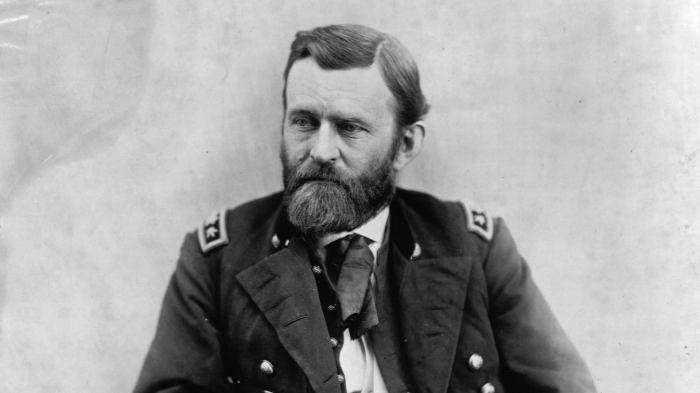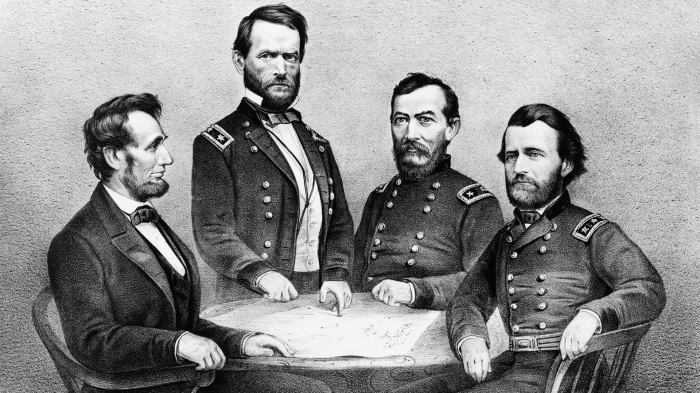In the annals of American military history, the names George McClellan and Ulysses S. Grant stand out as two of the most influential generals of the Civil War. Their contrasting leadership styles, strategic approaches, and military accomplishments shaped the course of the conflict and left a lasting legacy on the nation.
McClellan, a brilliant strategist known for his meticulous planning and cautious approach, initially commanded the Union Army of the Potomac. Grant, on the other hand, was a tenacious and aggressive general who favored bold maneuvers and relentless pursuit of the enemy.
Background and Early Careers

George McClellan and Ulysses S. Grant were two of the most prominent generals in the American Civil War. McClellan was born in Philadelphia, Pennsylvania, in 1826, and graduated from West Point in 1846. He served in the Mexican-American War and later resigned from the army to work as a railroad engineer.
Grant was born in Point Pleasant, Ohio, in 1822, and graduated from West Point in 1843. He also served in the Mexican-American War and later resigned from the army to work as a farmer and businessman.
Both McClellan and Grant returned to the army at the outbreak of the Civil War. McClellan was appointed commander of the Army of the Potomac, while Grant was given command of the Army of the Tennessee.
McClellan was a cautious and methodical general who favored a strategy of attrition. He believed that the Union could defeat the Confederacy by slowly grinding down its forces through a series of battles. Grant, on the other hand, was a more aggressive general who favored a strategy of maneuver.
He believed that the Union could defeat the Confederacy by quickly moving its forces to key points and cutting off its supply lines.
The Peninsular Campaign, George mcclellan and ulysses s. grant
In 1862, McClellan launched the Peninsular Campaign, an attempt to capture the Confederate capital of Richmond, Virginia. The campaign was a failure, and McClellan was replaced by Grant.
McClellan’s strategic decision-making during the Peninsular Campaign was flawed. He overestimated the strength of the Confederate forces and underestimated the difficulty of the terrain. He also failed to coordinate his movements with other Union armies, which allowed the Confederates to defeat him in detail.
Grant’s approach to warfare was more successful than McClellan’s. He used his superior mobility to outmaneuver the Confederates and cut off their supply lines. He also used his artillery effectively to support his infantry attacks.
The Vicksburg Campaign
In 1863, Grant launched the Vicksburg Campaign, an attempt to capture the Confederate stronghold of Vicksburg, Mississippi. The campaign was a success, and Vicksburg surrendered to Grant on July 4, 1863.
Grant’s strategies and tactics in the Vicksburg Campaign were innovative and effective. He used his superior mobility to outmaneuver the Confederates and cut off their supply lines. He also used his artillery effectively to support his infantry attacks.
The victory at Vicksburg was a turning point in the Civil War. It gave the Union control of the Mississippi River and split the Confederacy in two.
The Battle of Antietam
In 1862, McClellan fought the Battle of Antietam against Robert E. Lee’s Army of Northern Virginia. The battle was a bloody draw, but it was a strategic victory for the Union. It forced Lee to retreat into Virginia and prevented him from invading the North.
McClellan’s strategy at Antietam was to attack Lee’s flanks and cut off his line of retreat. However, McClellan was too cautious and failed to press his advantage. As a result, Lee was able to escape.
Grant’s approach to warfare was more successful than McClellan’s. He used his superior mobility to outmaneuver the Confederates and cut off their supply lines. He also used his artillery effectively to support his infantry attacks.
Comparison and Contrast
McClellan and Grant were two very different generals. McClellan was a cautious and methodical general who favored a strategy of attrition. Grant, on the other hand, was a more aggressive general who favored a strategy of maneuver.
McClellan’s strengths were his organizational skills and his ability to inspire his troops. Grant’s strengths were his strategic vision and his ability to adapt to changing circumstances.
McClellan’s weaknesses were his caution and his inability to make quick decisions. Grant’s weaknesses were his tendency to be reckless and his lack of attention to detail.
Ultimately, Grant was the more successful general. He won a series of decisive victories that led to the Union’s victory in the Civil War.
Questions and Answers: George Mcclellan And Ulysses S. Grant
Who was George McClellan?
George McClellan was a Union general known for his cautious approach and meticulous planning.
Who was Ulysses S. Grant?
Ulysses S. Grant was a Union general known for his aggressive tactics and relentless pursuit of the enemy.
What was the Peninsular Campaign?
The Peninsular Campaign was a Union campaign led by McClellan in 1862, which aimed to capture Richmond, Virginia.
What was the Vicksburg Campaign?
The Vicksburg Campaign was a Union campaign led by Grant in 1863, which resulted in the capture of Vicksburg, Mississippi.
What was the Battle of Antietam?
The Battle of Antietam was a major battle in 1862, which resulted in a tactical draw but a strategic victory for the Union.

